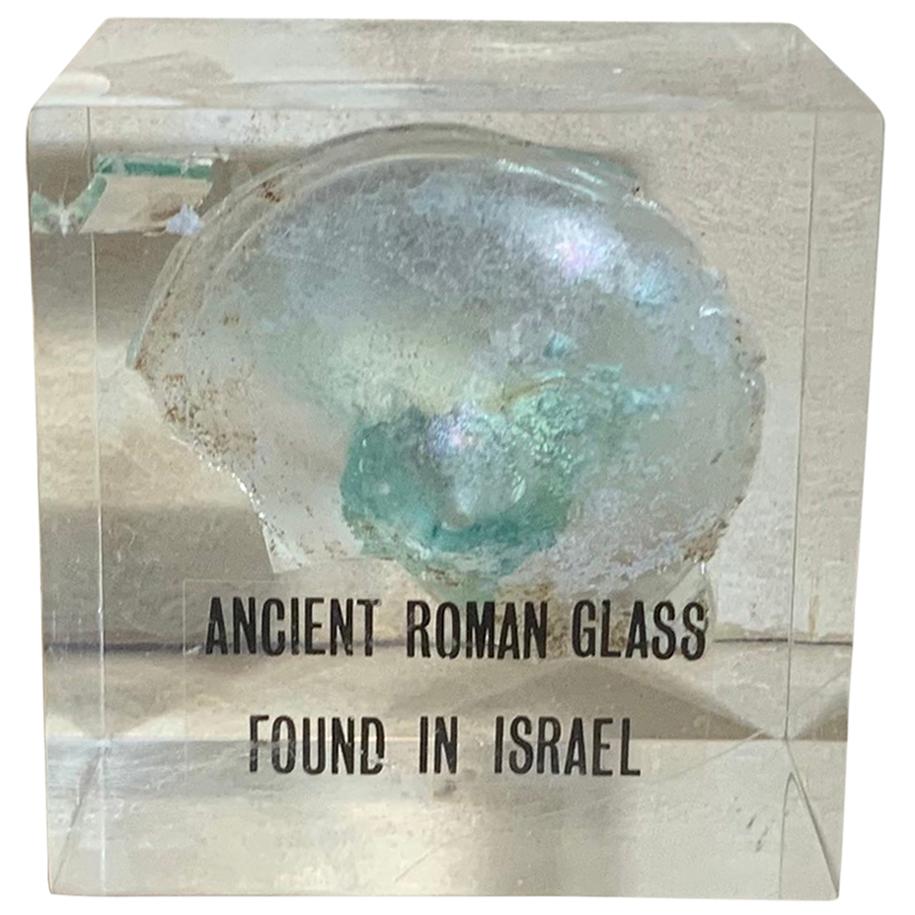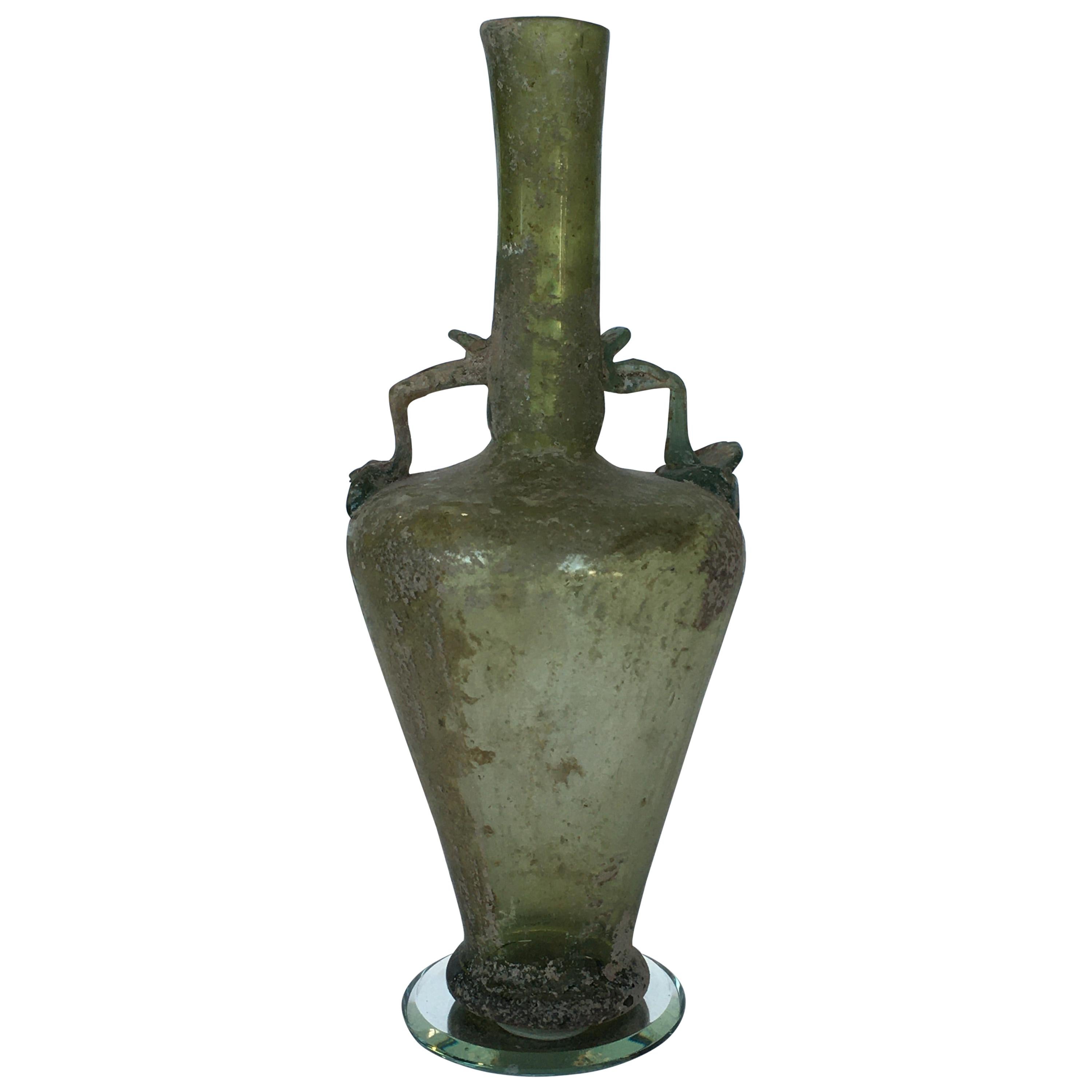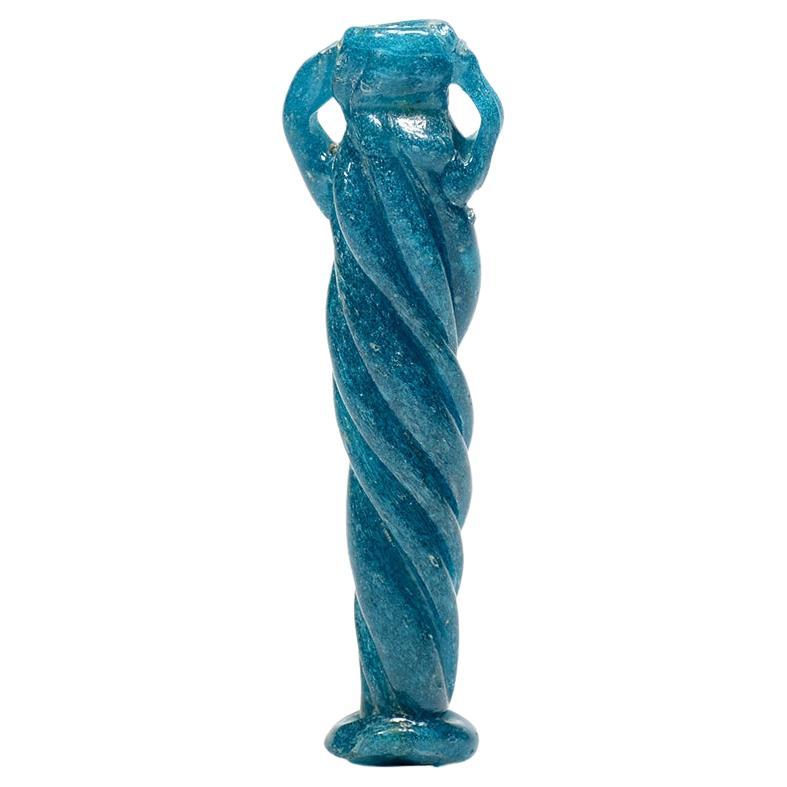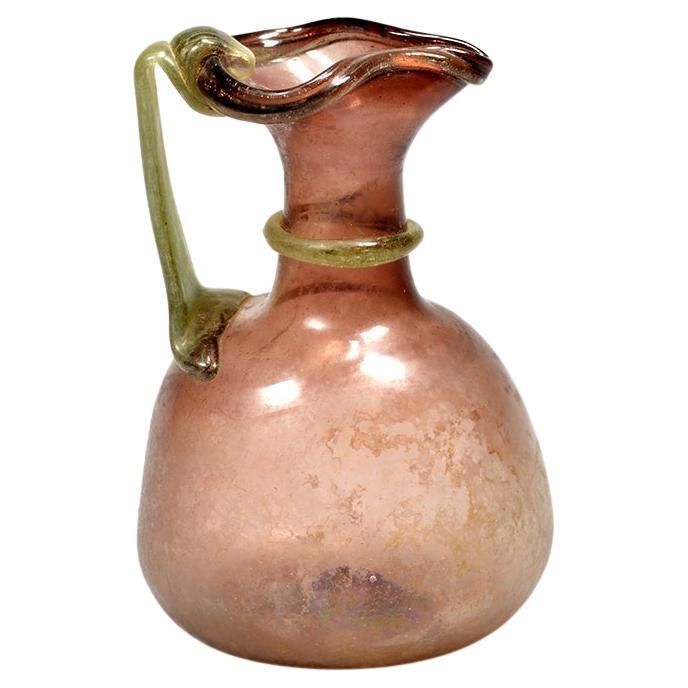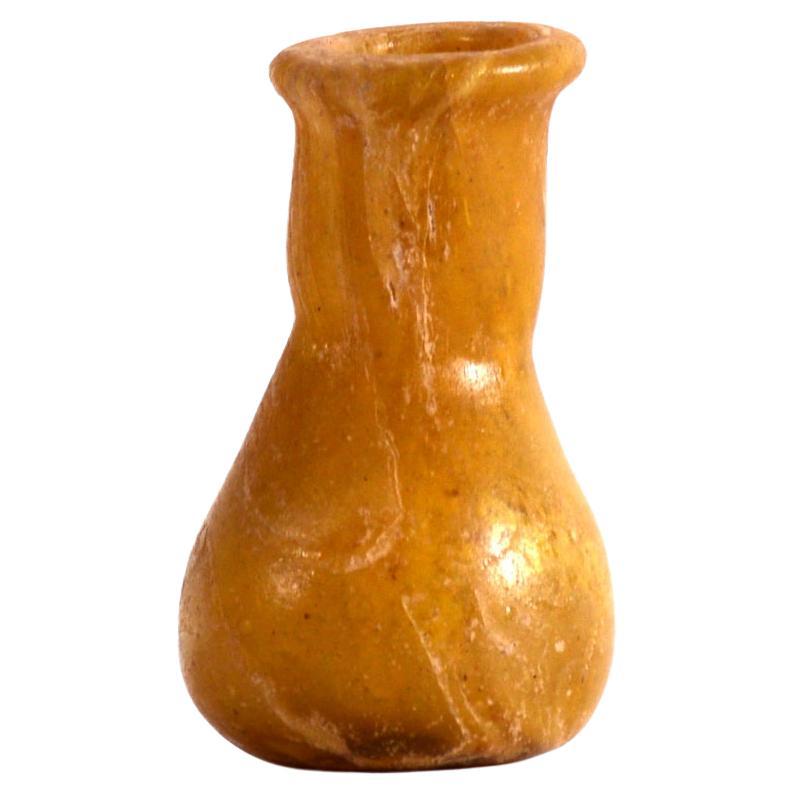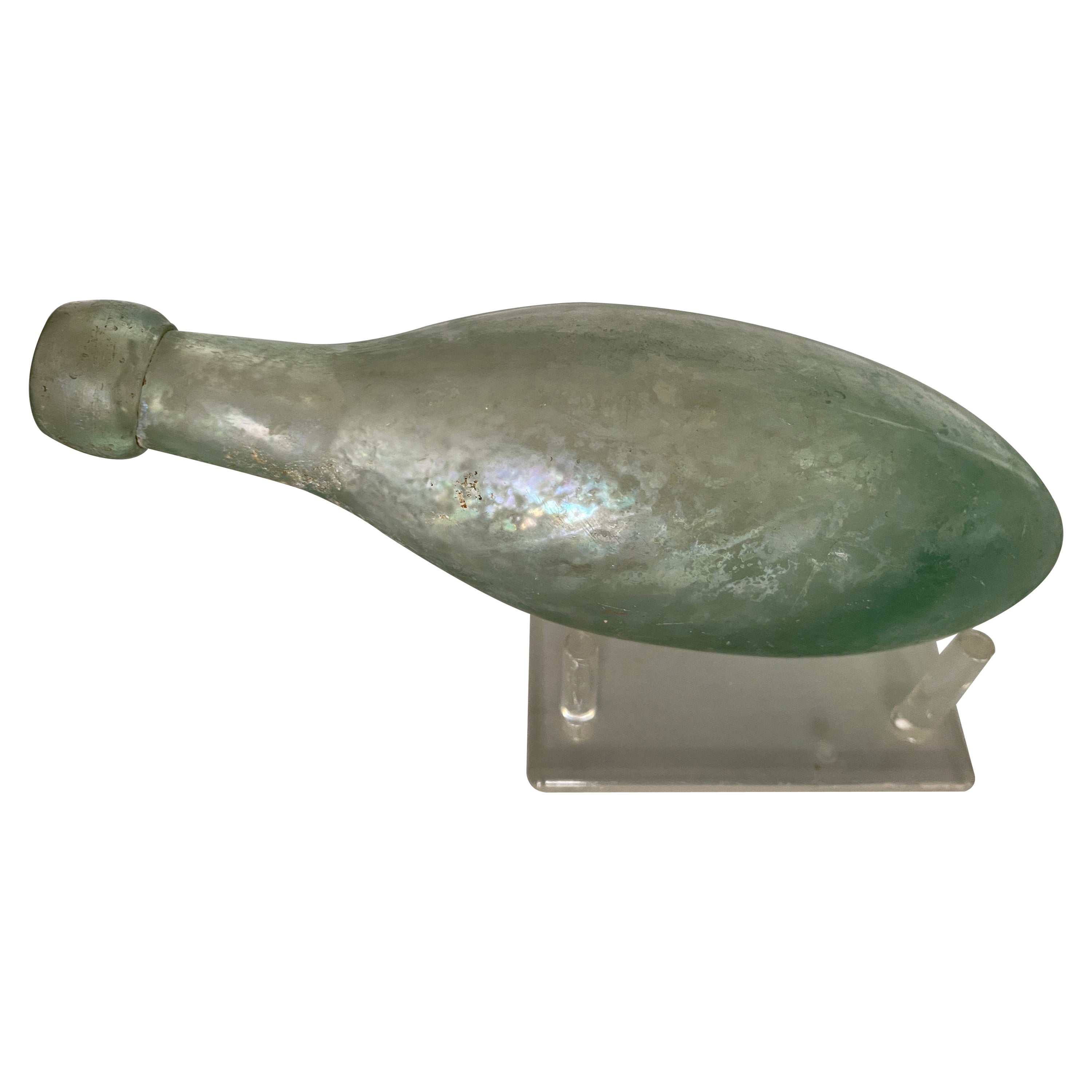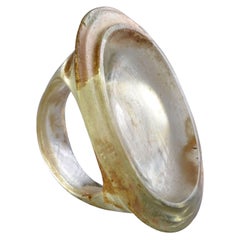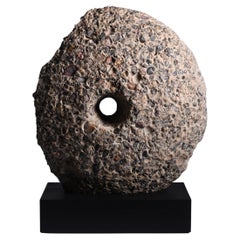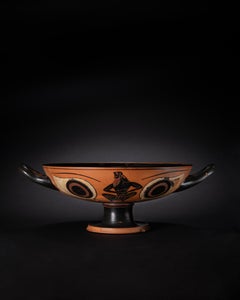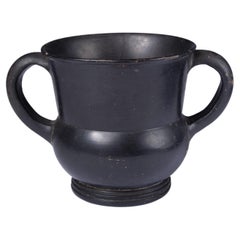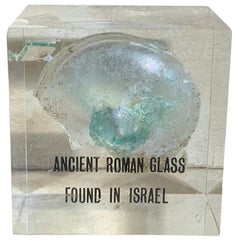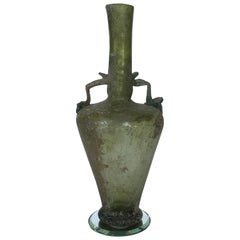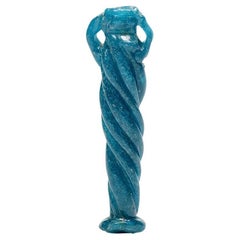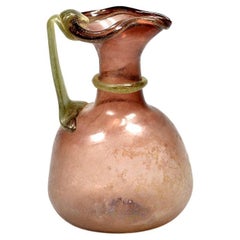Want more images or videos?
Request additional images or videos from the seller
1 of 8
Ancient Roman Turquoise Glass Cup
About the Item
Turquoise glass cup
Roman Empire, circa 3rd-4th century A.D.
With old label reading ‘’965’’.
“Pliny relates that the art of glass-making [.] was actually discovered under the reign of Tiberius, and that the shop and tools of the artist were destroyed, lest, by the establishment of this invention, gold and silver should lose their value.”
Suetonius Tranquillus, Life of Tiberius
This elegant piece of glassware was hand blown, with a gently flared lip and cone-shaped foot. Its maker, evidently an artisan of particular skill and patience, has achieved a beautiful semi-translucent turquoise hue across the cup, a fine example of the heights achieved in the glassmaking of the Roman Empire - a period of dynamic artistic development, ushered in by the advent of glass-blowing technology in the 1st Century A.D., which saw the emergence of a diverse range of styles and forms. Thanks to the quality of the pieces produced in the Roman workshops, these became one of the Empire’s most valued exports, with glasses such as this one traded far beyond the Mediterranean world, into Persia and India, and similar examples have even been discovered as far afield as Eastern China, unearthed in Han Dynasty burials from Guangzhou and Nanjing.
This piece comes from the collection of textile magnate Louis-Gabriel Bellon, who assembled one of the most important private collections of antiquities in nineteenth century France. Himself an archaeologist, trained by Auguste Terninck in 1874, he conducted numerous excavations, firstly in Saint-Nicolas-lez-Arras and later in Rouen, expanding his collection of antique glasses, vases, and bronzes. After a triumphant exhibition of terracotta figurines from Tanagra at the Paris World Fair in 1878, Bellon began showcasing his collection to the French public. In 1884, he exhibited in Rouen, at the Palace of the Consuls, where his collection was celebrated as the most impressive component of the show. As well as a collector and industrialist, Louis-Gabriel Bellon was a painter, and a close friend of the important proto-Impressionist artist, Camille Corot. After his death, Bellon’s son Paul (1844-1928) continued to expand his collection and transformed the family home in Saint-Nicolas into a private museum worthy of his father’s taste and vision.
Measures : Diameter: 9.2 cm
Height: 6.2 cm.
Provenance:
Collection of Louis-Gabriel Bellon (1819-1899), Saint-Nicolas-lez-Arras and Rouen
Thence by descent.
- Dimensions:Height: 2.45 in (6.2 cm)Diameter: 3.63 in (9.2 cm)
- Style:Classical Roman (Of the Period)
- Materials and Techniques:
- Place of Origin:
- Period:
- Date of Manufacture:circa 3rd-4th Century A.D.
- Condition:
- Seller Location:London, GB
- Reference Number:Seller: 429771stDibs: LU1052233173602
About the Seller
5.0
Recognized Seller
These prestigious sellers are industry leaders and represent the highest echelon for item quality and design.
Established in 2008
1stDibs seller since 2014
100 sales on 1stDibs
Typical response time: 2 hours
Associations
LAPADA - The Association of Arts & Antiques DealersInternational Confederation of Art and Antique Dealers' AssociationsThe British Antique Dealers' Association
- ShippingRetrieving quote...Shipping from: London, United Kingdom
- Return Policy
Authenticity Guarantee
In the unlikely event there’s an issue with an item’s authenticity, contact us within 1 year for a full refund. DetailsMoney-Back Guarantee
If your item is not as described, is damaged in transit, or does not arrive, contact us within 7 days for a full refund. Details24-Hour Cancellation
You have a 24-hour grace period in which to reconsider your purchase, with no questions asked.Vetted Professional Sellers
Our world-class sellers must adhere to strict standards for service and quality, maintaining the integrity of our listings.Price-Match Guarantee
If you find that a seller listed the same item for a lower price elsewhere, we’ll match it.Trusted Global Delivery
Our best-in-class carrier network provides specialized shipping options worldwide, including custom delivery.More From This Seller
View AllAncient Hellenistic Glass Finger Ring
Located in London, GB
This beautifully preserved ring was cast from light green transparent glass. Its large size and shape are typical of Hellenistic finger rings, and its now ...
Category
Antique 15th Century and Earlier Classical Greek Glass
Materials
Glass
Ancient Gallo Roman Millstone
Located in London, GB
Gallo-Roman Quernstone
Fécamp, Seine-Maritime, France
Circa 2nd century BC - mid-4th century AD
Carved puddingstone
Diameter: 43 cm
The lower grinding stone from a late Iron Age, ea...
Category
Antique 15th Century and Earlier French Mounted Objects
Materials
Stone
Ancient Greek Erotic Kylix Drinking Cup
Located in London, GB
Erotic Drinking Cup
Archaic Greece, c.530 BC
Black-figure pottery
29 cm wide
A rare, erotic cup exemplifying the revelry and humour of ancient Greek culture, particularly within the...
Category
Antique 15th Century and Earlier European Classical Greek Vases
Materials
Pottery
Ancient Greek Black Glaze Kantharos Wine Cup
Located in London, GB
Greek Black Glaze Kantharos
Circa Early 4th Century B.C.
Terracotta
With old label reading ‘No. 133’
Height: 8.8 cm
This 4th Century B.C. kan...
Category
Antique 15th Century and Earlier Classical Greek Vases
Materials
Ceramic
Roman Marble Foot
Located in London, GB
Roman marble Fragment of a Right Foot with Sandal
Circa 1st - 2nd Century A.D.
An evocative Roman marble fragment, preserving the front portion of an over-lifesized sandalled foot. The toes, nails, and bridge of the foot have been sensitively carved. The outer sole of the sandal remains, with delicate, pointed straps joining between the first two toes in a diamond shape.
This fragment once belonged to Danish sculptor Jens Adolf Jerichau...
Category
Antique 15th Century and Earlier Italian Classical Roman Figurative Scul...
Materials
Marble
Roman Marble Statuette of Jupiter
Located in London, GB
Roman Marble Fragment of jupiter
Circa 2nd-3rd Century A.D.
Measure: Height: 19.7 cm
This beautiful Roman fragmentary statuette depicts Jupiter, the king of the gods, here recognisable from his two chief attributes, the eagle with outstretched wings - according the Pseudo-Hyginus, singled out by Jupiter because ''it alone, men say, strives to fly straight into the rays of the rising sun'' - and the base of the scepter, which remains at the side of the left foot, an aspect likely borrowed from the statue of Zeus at Olympia, once one of the Seven Wonders of the World. Though much of the original piece has been lost, the subtle anatomical detail in the feet mark this out as a piece of exceptional quality, and the work of an artist of particular talent and patience - as Johann Winckelmann once said of the famous Belvedere Torso, ''if you contemplate this with a quiet eye [...] the god will at once become visible in this stone.''
This fragment once caught the eye of Henry Howard, 4th Earl of Carlisle (1694-1758), a Knight of the Garter and among the most prolific collectors of his day. The piece, acquired during his travels to Rome, was proudly displayed on an alcove of the Western Staircase of Castle Howard...
Category
Antique 15th Century and Earlier Italian Classical Roman Figurative Scul...
Materials
Marble
You May Also Like
Ancient Roman Glass
Located in Delray Beach, FL
Beautiful original ancient Roman glass embedded in Lucite cube, was used for containing perfume. Exceptional object of art for display.
Category
Antique 15th Century and Earlier Israeli Glass
Materials
Murano Glass
$395 Sale Price
71% Off
Ancient Roman Glass Bottle
Located in Los Angeles, CA
Ancient Roman glass bottle with thin thumb handles, circa 2nd-3rd century AD. Origin Roman Empire.
Category
Antique 15th Century and Earlier Italian Other Glass
Materials
Glass
A Late Roman turquoise glass rod-formed balsamarium
Located in UTRECHT, UT
Glass balsamarium with a twisted tubular body, tapering towards the applied disc base, with two trailed handles
12.0 cm (h)
Provenance:
Ex anonymous Sale; Pierre Bergé Auctioneers, Paris, 17 January 2009, lot 38
Roman glass was used primarily for the production of vessels. It developed from Hellenistic technical traditions, initially concentrating on the production of intensely coloured cast glass...
Category
Antique 15th Century and Earlier Italian Classical Roman Glass
Materials
Glass
A Roman purple glass jug
Located in UTRECHT, UT
A jug with a bell-shaped body and clover lip, a green trailed handle and a green collar in the middle of the cylindrical neck.
12.4 cm (h)
Intact
Provenance:
Ex C.A. Hessing Collection, coll. no.57
Ex Anonymous sale; Bonhams, London, 22 September 1998, lot 226
Published:
Sheppard & Cooper Ltd, Glass: The Eighth Wonder of the Ancient World, London, 1994, p.14, no.75.
Roman glass was used primarily for the production of vessels. It developed from Hellenistic technical traditions, initially concentrating on the production of intensely coloured cast glass vessels...
Category
Antique 15th Century and Earlier Italian Classical Roman Glass
Materials
Glass
$7,197
A Roman yellow glass unguentarium
Located in UTRECHT, UT
Belly-shaped with cylindrical neck and with folded down collar rim, the unguentarium with twisted glass decoration with white intertwining the main yellow colour
4.5 cm (h)
Intact
Ex. German private collection H.G., collected between 1970s-1990s
Roman glass was used primarily for the production of vessels. It developed from Hellenistic technical traditions, initially concentrating on the production of intensely coloured cast glass vessels...
Category
Antique 15th Century and Earlier Italian Classical Roman Glass
Materials
Glass
Ancient Classical Style Antique Iridescent Glass Bottle
Located in New York, NY
Lucite base holder, Measures. 3.4" x 4.2" x 1.8"L.
Category
Antique Mid-18th Century Unknown Classical Roman Bottles
Materials
Blown Glass
Recently Viewed
View AllMore Ways To Browse
Ancient Roman Gold
Ancient Roman Empire
Ancient India Gold
Antique Chinese Silver Vases
La Cartuja
La Siesta Hermes
Lac Burgaute
Lacquer Hsunok
Ladykillers Movie Poster
Lalanne Ginkgo
Lalique Bourgueil
Lalique Cactus Perfume Bottle
Lalique Charger
Lalique Ganymede
Lalique Knife Rest
Lalique Lion Head Bowl
Lalique Lovebirds
Lalique Marguerites Bowl
